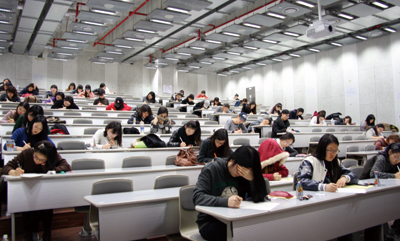
On this day, a surprisingly large number of Ewha students gathered in six classrooms of the Ewha Campus Complex (ECC) to participate in the 1st Ewhain Reading Contest in which they had to write a book review on one of nine pre-designated humanities books, such as John Coetzee’s “The Lives of Animals” or Marjorie Shostak’s “Nisa.”
“We had originally anticipated about a hundred students to turn up, so we were delighted to see more than four times the expected number of students,” said Ryu Hae-jin, a Center for General Education (CGE) employee who was in charge of this event.
Held on Jan. 16 by the CGE, the 1st Ewhain Reading Contest was intended to promote reading and provide a place for many Ewha students to communicate and interact by reading and writing together.
“As for the reading list, the CGE received book recommendations from experts in philosophy, history, literature, society, art and culture, and science. Based on the recommendations, we tried to stray from picking books that were too old or widely read, choosing books that had not received much spotlight before instead,” Ryu said.
The panel of judges comprised 11 Ewha professors from various majors, and on the CGE homepage, each professor provided detailed analyses of the books and comments on some of the submitted reviews. The professors, who wished to remain unnamed, also indicated the standards by which they evaluated reviews.
“The main criteria we graded by was whether the student showed holistic and creative thinking, wrote in-depth, and expressed her original idea in authentic language,” one professor wrote.
Along with the commentaries, heartfelt advice was also given to students. In the case of Kim Hong-jung’s “Ma-um-ui-sa-hui-hak (Sociology of the Mind),” a professor addressed many students who had chosen the book because of its eye-catching title, but whose essays showed traces of bafflement at the obscure content.
“Students should refrain from letting the convoluted contents of a book thwart them from conquering the book. Don’t give up on reading or understanding the book even if it seems too hard,” the professor advised.
The results of the contest were announced on Feb. 16 and eight students were announced as winners at the award ceremony on Feb. 29. The honorary first place went to Kim Ha-young (History Education, 4), who wrote on Primo Levi’s “If This Is a Man.”
“I had never been the first at anything before, so I couldn’t believe it when I had heard the news,” Kim said. “‘If This Is a Man’ coincided with my major and probed topics that I had pondered over before, like the human slaughter that occurred during the Holocaust, giving me plenty of thoughts to fish out.”
In the panel’s feedback, Kim was praised for “writing considerably more than other students in the given time and showing not only serious contemplation over traits make humans truly humane in relation to the title, but also criticism on the author’s statement that only reason can overcome fascism.”
“I liked that this contest promoted reading, but some students seemed to be there merely for the prizes, which were tickets for Art House Momo,” said a participant Byeon Yoon-ji (Library and Information Science, 3). “There were additional glitches in the contest, probably because this was its first year. However, I hope the school holds events like this more often in the future.”
Ryu admitted that there were numerous problems in the course of the contest.
“The entire schedule had to be postponed because we had so many participants. The students also had to be divided into six classrooms for the contest, even though we had originally directed all of them to just one classroom.”
On the other hand, Ryu announced the possibility of second reading contest during summer vacation.
“The contest will focus on reading classics, and students may have to read more than one book this time,” Ryu said. “We will have to give some thought as to what to award the winners despite the increased reading so that students may be encouraged to participate.”
Chung Yoon-young
yychung@ewhain.net

